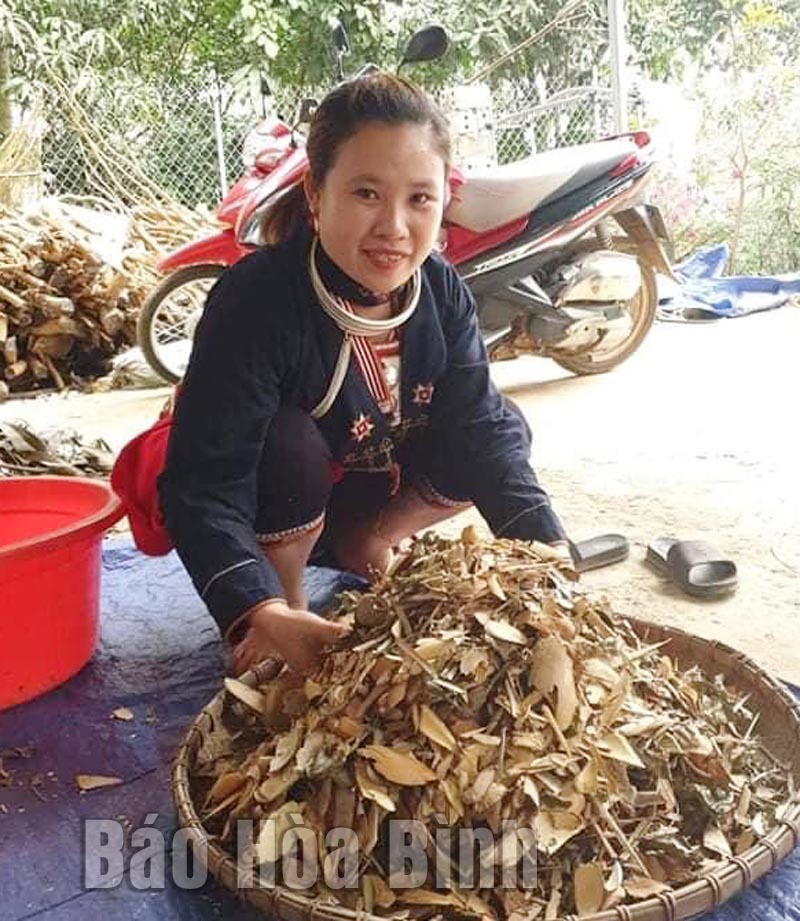
(HBO) – With strength in traditional herbal medicine practice and dedication, responsibility of its members, Ngoc Sang Herbal Cooperative in Tien Lam hamlet in Bac Phong commune of Hoa Binh province's Cao Phong district has improved the quality of their products, contributing to preserving traditional practices while generating jobs for local Dao ethnic women.
Director of the Ngoc Sang Herbal Cooperative Bui Thi Ngoc is deeply dedicated to traditional herbal medicine products of the Dao ethnic group.
Bui Thi Ngoc, Director of the Ngoc Sang Herbal Cooperative, said taught by her husband's family, she started learning to collect herbs in 2018. Faced with the challenge of not only preserving the traditional practice but also enhancing its value, her family urged villagers to establish and develop the cooperative. Currently, it has seven members.
She added that with the advantage of abundant raw materials and several distinctive plant species, the cooperative has boldly expanded its market and developed the herbal practice more professionally. Currently, it has eight products, including stomach medicine and Dao people's herbal bath products as key ones.
Since its inception, the cooperative has partnered with local residents to buy medicinal materials. At the same time, it expanded material growing area to over 1 ha to grow valuable medicinal plants.
To achieve the success, Ngoc and the cooperative's members are grateful to the Women's Unions at various levels, which has supported them in training workshops, skill development sessions, and free traceability labels. They also joined trade promotion fairs in the northern region, through which their brand has become known. Each year, the cooperative produces around 300 kg of refined balm and two tonnes of raw herbs. Via trade fairs, they manage to sell about 200 kg of refined balm and one tonne of raw herbs. The remaining products are directly sold at the production facility or through online channels.
Bui Thi Dung, Chairwoman of the Women's Union of Bac Phong commune, said since its establishment, the cooperative has achieved significant results, contributing to creating high economic value, stable jobs and steady income for its female members. Each member earns an average income of 8-10 million VND (347-434 USD) per month.
Furthermore, it has helped 20 local women with seasonal jobs, with each earning 5-6 million VND per month. With their efforts and achievements, the cooperative has recently received a certificate of merit from the provincial Women's Union in a programme to honour outstanding grassroots officials and exemplary models in the community.
Hoa Binh province is undergoing a dynamic transformation amid Vietnam’s national digital transition. Building on Poliburo’s Resolution No. 57-NQ/TW on breakthroughs in science, technology, innovation, and national digital transformation, the province has rolled out a wide range of practical action plans. A standout initiative is the "Digital Literacy for All” movement, an effort to ensure that no one is left behind in the digital era.
Hoa Binh province is undergoing a dynamic transformation in the wake of the national digital transformation movement. Building on Resolution No. 57-NQ/TW of the Politburo on breakthroughs in science, technology, innovation, and national digital transformation, the province has implemented a wide range of practical action plans. A standout initiative is the "Digital Literacy for All” movement ambitious effort to ensure that no one is left behind in the digital age.
With a spirit of unity and proactive problem-solving, the Party Committee, the government and the people of Dong Lai Commune (Tan Lac District) have made great strides in implementing the resolutions of the 24th Party Congress of the commune for the 2020 - 2025 term. Focusing on leadership and practical actions, the commune has brought the Party’s resolutions into daily life, creating strong impacts and pushing the local development forward.
Amid the nationwide push for digital transformation, young people in Hoa Binh Province are stepping up as dynamic pioneers, applying technology to enhance Youth Union operations and expand the reach of youth-led initiatives. Through creativity and adaptability, Youth Union organizations at all levels have introduced a series of practical solutions, contributing to modern governance and community development.
In recent years, An Nghia commune, located in Lac Son district, has stepped up administrative reform, focusing on improving the quality and efficiency of its single-window service unit for receiving and processing administrative procedures. These improvements have helped create favourable conditions for local residents and organisations to handle administrative procedures, contributing to the commune’s broader socio-economic development.
The Prime Minister-approved master plan to develop the multi-use value of forests ecosystems through 2030, with a vision to 2050, aims to improve the management and sustainable use of forest resources, create jobs, increase incomes, and improve the living standards of ethnic minorities, people in mountainous and remote areas, forest workers and those living near forests.



